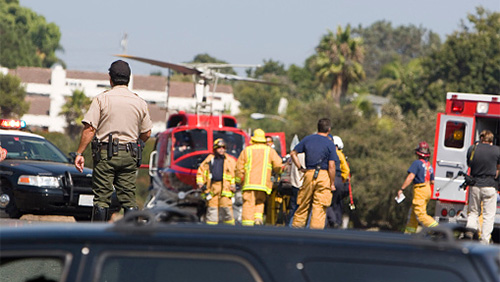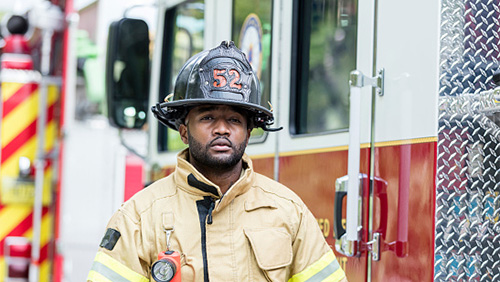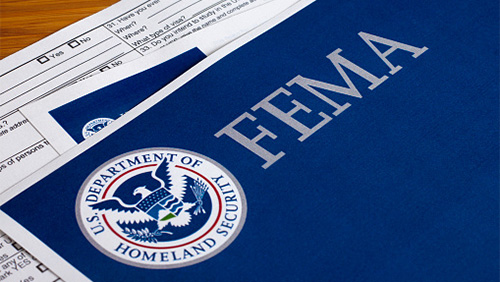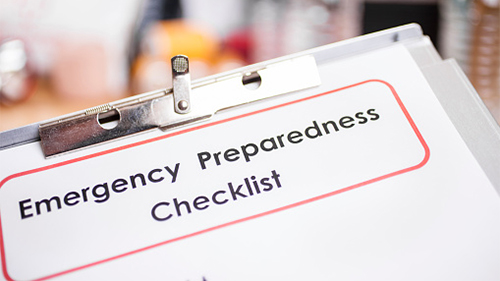With a pandemic, economic crisis, & political unrest, there’s no better time to learn about homeland security, and the chair of Coastline’s homeland security department, Dr. Kevin Sampson.

In the early 1990s, as Dr. Kevin Sampson puts it, there were only four academic programs dedicated to homeland security or emergency management around the United States. “Now there are over 600,” Sampson remarks, illustrating with just two sets of numbers how radically important this field has become in the United States, and around the world.
Dr. Sampson, the chair of the department of emergency management, homeland security, and criminal justice at Coastline and previous department chair of the criminal justice program at Fullerton College, started his career in homeland security long before either of those numbers, four and 600, come into play, as a police officer in Alhambra, California.
Explore Emergency Management @ Coastline
“I worked in police work, and have since the early 1980s,” and, when the city integrated the police department and fire department into one organizational structure, Sampson used his police experience to begin investigating arsons and suspicious fires. For perspective, Sampson told me that the Department of Homeland Security, created after 9/11, is now the third-largest federal government agency, employing tens of thousands of people “in ensur[ing] we keep the continuity of government,” which Sampson points out is exactly the issue that recently played out at the Capitol.

In Alhambra in the 1980s and 90s, Sampson and others around California saw a need both to create educational programs that highlighted and taught disaster preparedness and intelligence gathering, essentially how we can prevent calamities, or take them in stride once they occur. They dealt with disasters like fires, earthquakes, and other events that needed on-the-ground intelligence, like riot control, and more besides.
“A lot of people didn’t have a background in understanding emergency management, disaster management, command systems,” Sampson says. Fire departments had an understanding and command structure suited for disasters, but not for intelligence gathering; police departments had the opposite problem. There needed to be a way to coordinate and instruct officers on both sides, as well as civilians, in incident response.
On a broader level, in a post-9/11 world, Sampson says, homeland security, not just as a government agency, but a set of ideas, theories, and practical measures, “is right in the middle” of ensuring democracy itself “so that our institutions stay strong.” Furthermore, as Sampson put it, politics, be it left or right-leaning is “totally irrelevant” to the issue of best protecting American lives: “The job of homeland security and emergency management is to ensure the movement forward of the United States of America in terms of its basic values and principles.”
After working in law enforcement for many years, Dr. Sampson returned to school himself, receiving his Ed.D. in Education “with an emphasis on law” from USC’s Rossier School of Education (though he obviously spent a lot of time at USC’s Gould School of Law as well). When he was asked by a colleague why he was focused on getting a doctorate in Education (instead of going to law school) if his plan was to teach pre-law, which it was, Dr. Sampson replied: “‘I don't want to practice law, I want to teach law,'" an all-important distinction.
Dr. Sampson had a lot of insightful things to say about emergency management, homeland security, and career paths one can pursue in these fields, so I’m going to bring up a few more of his quotes in the form of a Q&A below. I hope you learn as much from his thoughtful wisdom as I did.

What is the importance of homeland security?
“Homeland security requires a deeper understanding of not just making sure that the local street corner is safe,” says Sampson. “The mission of homeland security is simply to keep our institutions in good-standing [and] good health,” including the current pandemic, which “incorporates the same issues we need to address to ensure the safety of the people in our country.”
What Dr. Sampson’s remarks boil down to is this notion that homeland security (and emergency management, which falls underneath the homeland security umbrella) lies at the heart of democracy, a “guard rail,” as Dr. Sampson put it, to keep us safe and moving forward.
Learn More About Cybersecurity @ Coastline
What sorts of careers can someone expect in homeland security?
“Homeland security incorporates many different types of jobs,” including police and firefighters, but it can also “go into private security, corporate security, cybersecurity, information security, election security,” and more besides. “People who run drones now,” says Dr. Sampson, are included under the wide umbrella of homeland security issues. Disaster management, on both a local and national level, is also encompassed within the study of homeland security, “spanning industry, business, government, all categories.”

What do you like about teaching at Coastline?
“What Coastline has done is provided a program to develop the data, research, [and] faculty development that is needed to create an infrastructure to ensure that these kinds of academic disciplines that are emerging across the state have a basis for somebody to go out and help,” says Dr. Sampson. Earlier in our interview, Sampson noted that Coastline offered, starting in 2008, the first operational program in emergency management and homeland security in the California Community College system.
“The Coast Community College District, and Coastline as a college, is a unique structure that has really been the pioneer of online education, using the TV as education, and public education that’s out there,” Dr. Sampson went on. “If you ask me why I like Coastline, it’s because of innovation.”
Wrappin’ It Up
Talking with Dr. Sampson was a pleasure beyond the ideas he imparted on the development of homeland security in the United States and the state of California. Dr. Sampson was even willing to spend some extra time listening to a question I had asked about my own academic future, giving me a thoughtful, considerate answer. He was warm, personable, and easy to talk to, something we all want from our professors and mentors.